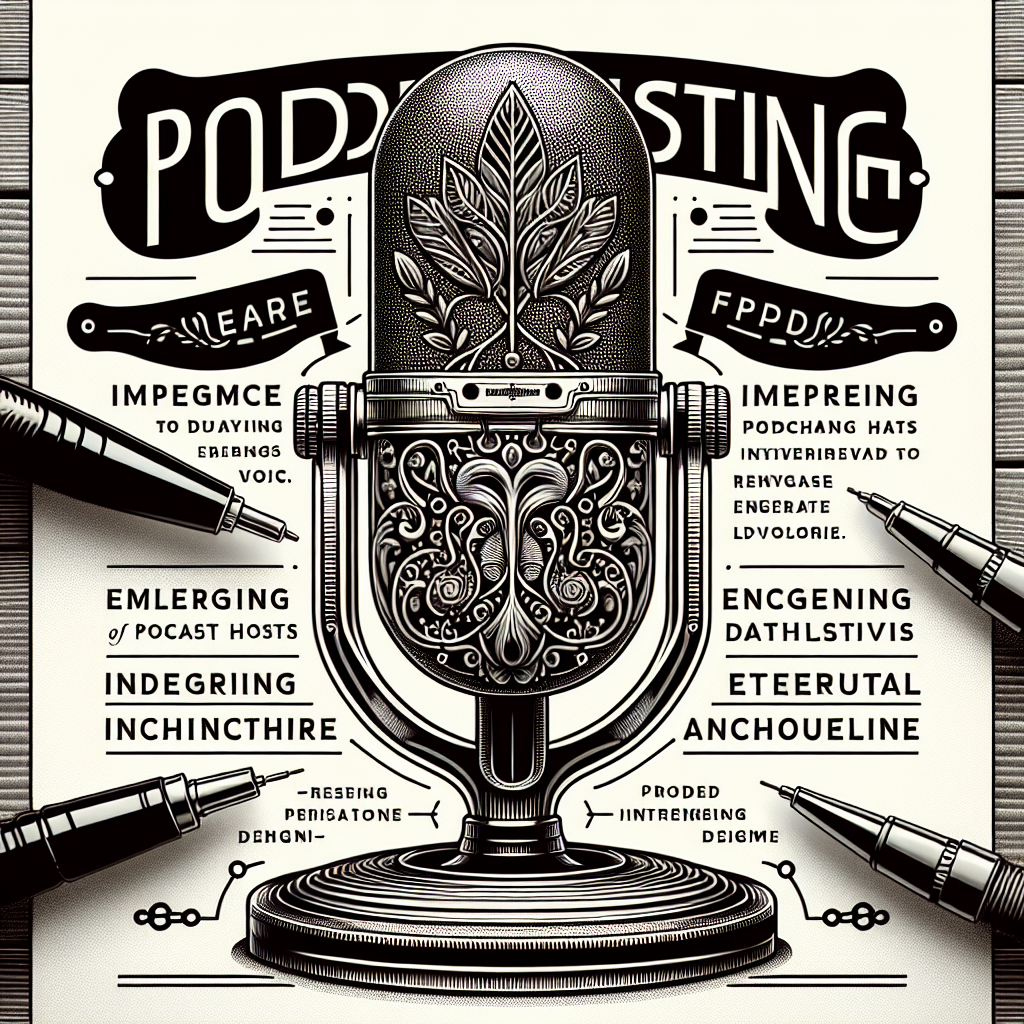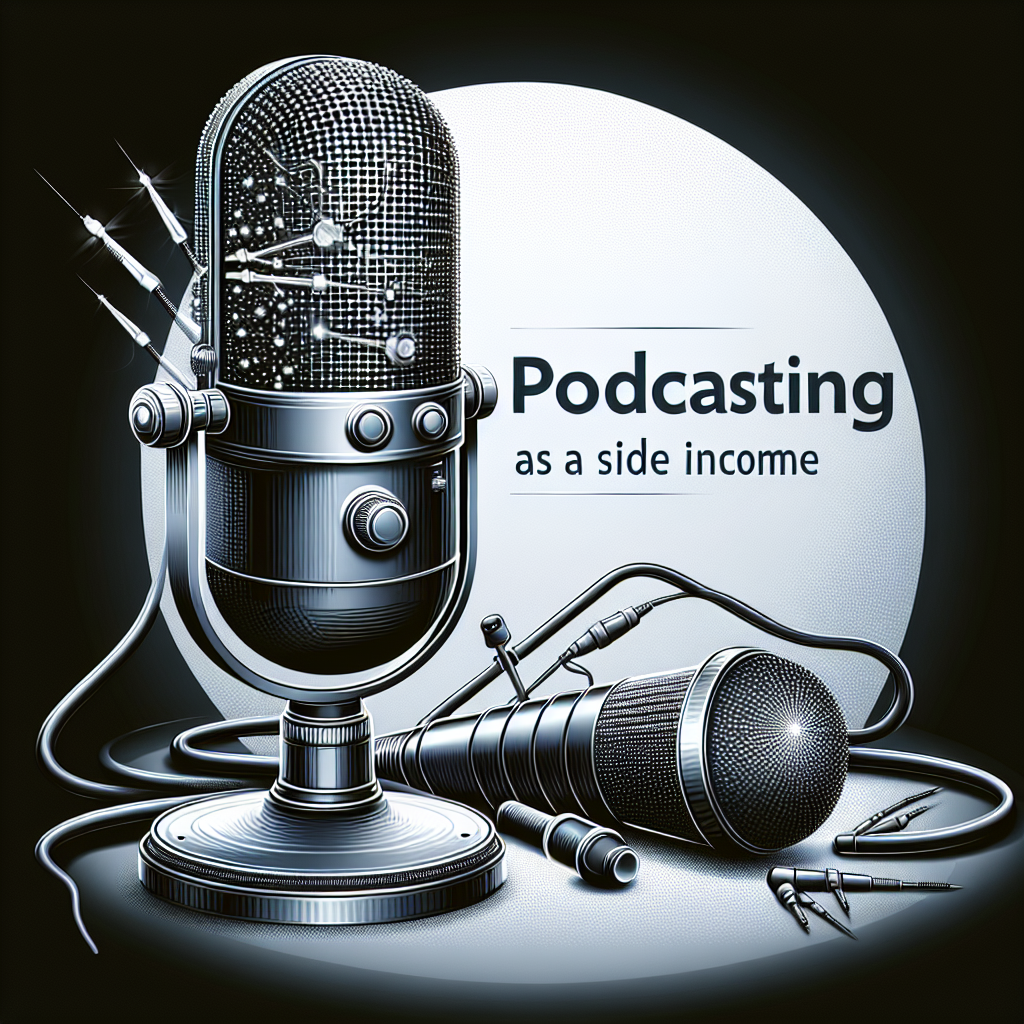Are you passionate about podcasting and looking for ways to make some extra money on the side? Look no further! In this article, we will explore some great side hustles that can help you earn additional income while doing what you love as a podcast host. Whether it’s monetizing your podcast through sponsorships, offering coaching or consulting services, or even creating merchandise for your loyal listeners, there are countless opportunities to turn your podcasting hobby into a profitable venture. So, let’s dive into the exciting world of side hustles for extra money as a podcast host!

Side Hustles as a Podcast Host
Starting a podcast side hustle can provide numerous benefits, such as flexibility and a creative outlet. As a podcast host, you will have the freedom to create content on your own terms, allowing you to manage your time effectively while pursuing your passion. Additionally, podcasting offers an opportunity to build an online presence and establish yourself as an authority in your chosen niche. Not only will you develop valuable communication skills, but you will also have the chance to connect with like-minded individuals and build a community around your podcast. In this article, we will explore the various aspects of starting a podcast side hustle, including the necessary skills, choosing a niche, setting up your podcast, creating engaging content, recording and editing your episodes, promoting and growing your audience, monetizing your podcast, networking with other podcasters, as well as overcoming challenges and tips for success.
Benefits of Starting a Podcast Side Hustle
Flexibility and Freedom
One of the primary advantages of starting a podcast side hustle is the flexibility it offers. You have the freedom to choose when and where you record your episodes, allowing you to work around your existing commitments. Whether you’re a busy parent, a full-time professional, or someone looking to earn extra money, podcasting can fit seamlessly into your schedule.
Building an Online Presence
As a podcast host, you have the unique opportunity to build an online presence and expand your reach. By consistently producing valuable and engaging content, you can attract a loyal audience and establish yourself as an authority in your niche. This online presence can open doors to various opportunities, such as collaborations, speaking engagements, and even potential career advancements.
Developing Communication Skills
Hosting a podcast requires strong communication skills. You need to be able to articulate your thoughts, engage with your audience, and interview guests effectively. Over time, you will develop your public speaking abilities and refine your communication style, which can benefit you in both personal and professional settings.
Building a Community
Podcasting allows you to connect with like-minded individuals who share your interests and passions. By addressing topics that resonate with your audience, you can foster a sense of community and create a space where listeners feel engaged and valued. Your podcast can become a platform for discussions, feedback, and support, ultimately bringing people together.
Creative Outlet
If you have a creative streak, podcasting provides an excellent outlet for self-expression. You have the freedom to explore different formats, experiment with different topics, and showcase your unique personality. Whether you want to entertain, educate, or inspire your audience, podcasting allows you to unleash your creativity and produce content that resonates with you and your listeners.

Skills Needed to be a Podcast Host
Public Speaking and Communication Skills
As a podcast host, your ability to communicate effectively is paramount. You will be speaking to an audience, so it’s essential to articulate your thoughts clearly, engage listeners, and create a captivating listening experience. Good speaking skills, including voice modulation, pacing, and using appropriate language, will enhance your podcast’s overall quality and make it more enjoyable for your audience.
Research and Organization Skills
To produce informative and engaging content, you must have strong research and organization skills. Thoroughly researching your topics, gathering relevant information, and organizing it in a logical manner will ensure that your episodes are well-informed and structured. Planning your episodes in advance and creating an outline can help you stay organized and provide a smooth flow of information.
Interviewing Skills
Many podcasts feature interviews with guests, and being able to conduct interviews effectively is crucial. Asking thought-provoking questions, active listening, and maintaining a conversational atmosphere are essential skills for hosting engaging interviews. Mastering the art of interviewing will allow you to bring out the best in your guests and create captivating content for your audience.
Time Management Skills
Podcasting requires careful time management to ensure the consistent release of episodes. Planning your podcasting schedule, setting deadlines, and allocating time for research, recording, editing, and promotion are all necessary skills to maintain a regular podcasting routine. Good time management will help you avoid last-minute stress and ensure the quality and reliability of your podcast.
Audio Editing Skills
Basic audio editing skills are essential for producing polished episodes. Learning to edit your podcast episodes, remove any background noise, enhance audio quality, and add music and sound effects will improve the overall listening experience for your audience. While you can outsource this task to a professional editor, having some knowledge of audio editing will give you greater control over your podcast’s final product.
Choosing a Niche for Your Podcast
Identifying Your Interests and Passion
When selecting a niche for your podcast, it’s crucial to identify your interests and passions. Podcasting about topics you genuinely care about will not only make the experience more enjoyable for you but also help you connect with an audience that shares your enthusiasm. Take some time to reflect on your interests and consider which topics excite and inspire you the most.
Researching the Market
Before finalizing your podcast niche, it’s essential to research the market to understand the competition and identify potential gaps or opportunities. Look for podcasts in your chosen niche and analyze their content, format, and audience engagement. Identify what makes your podcast unique and how you can add value to the existing market.
Narrowing Down Your Topic
Once you have identified your interests and researched the market, it’s time to narrow down your podcast topic. Consider focusing on a specific aspect or subtopic within your broader niche. This specialization will help you attract a dedicated audience while ensuring that your content remains focused and relevant.
Considering Target Audience
Understanding your target audience is crucial for creating content that resonates with them. Consider demographics such as age, gender, interests, and preferences when selecting your podcast niche. Researching and understanding your target audience will help you tailor your content, develop a unique voice, and engage with your listeners effectively.
Finding a Unique Angle
With the abundance of podcasts available, finding a unique angle is essential to stand out from the crowd. Consider what makes your podcast different or what perspective you can bring to the table. It could be a specific format, a personal experience, or a fresh take on a well-established topic. Finding your unique angle will help you attract and retain an audience who is looking for something distinct.

Setting Up Your Podcast
Selecting the Right Equipment
Choosing the right equipment is essential for producing high-quality podcast episodes. Invest in a good microphone, headphones, and a pop filter to ensure clear and professional-sounding audio. Additionally, consider using a microphone stand or boom arm to minimize handling noise and improve your recording experience.
Choosing a Podcast Hosting Platform
A podcast hosting platform is crucial for distributing and managing your podcast episodes. Research and compare different hosting platforms based on factors such as pricing, analytics, ease of use, and features. Look for a platform that allows you to customize your podcast’s branding, provides reliable RSS feeds, and offers sufficient storage space for your episodes.
Creating Cover Art and Intro Music
Catchy cover art and compelling intro music are essential for attracting potential listeners and creating a memorable brand for your podcast. Design eye-catching cover art that reflects your podcast’s theme and communicates its essence. Additionally, consider creating or commissioning original intro music that sets the tone for your episodes and leaves a lasting impression on your audience.
Crafting a Compelling Description
Your podcast’s description plays a significant role in attracting new listeners. Craft a compelling and concise description that clearly communicates what your podcast is about and what listeners can expect. Highlight the unique value you offer and the benefits of tuning in to your podcast.
Naming Your Podcast
Choosing a memorable and descriptive name for your podcast is crucial for brand recognition and discoverability. Brainstorm a range of names that reflect your podcast’s theme and resonate with your target audience. Conduct a quick search to ensure your chosen name is not already in use by another podcast.
Creating a Consistent Schedule
Consistency is key when it comes to podcasting. Choose a regular release schedule that suits your availability and commit to it. Whether you release episodes weekly, biweekly, or monthly, maintaining a consistent schedule will help you build trust with your audience and keep them coming back for more.
Creating Engaging Content
Planning Episode Topics
The first step in creating engaging content is planning your episode topics. Brainstorm a list of potential topics that align with your podcast’s niche and resonate with your target audience. Consider trends, current events, and recurring themes within your niche that will capture your audience’s interest.
Structuring Episodes
A well-structured episode can keep your audience engaged from start to finish. Consider dividing your episodes into segments or sections to create a sense of flow and variety. Introduce your topic, provide context or background information, and present your main points or storylines. Conclude with a summary or call to action to encourage your audience’s participation.
Incorporating Storytelling
Storytelling adds depth and relatability to your podcast episodes. Weave personal anecdotes, case studies, or narratives into your episodes to captivate your audience and create an emotional connection. Stories can help illustrate complex concepts, engage your listeners’ emotions, and bring your content to life.
Researching and Fact-checking
Thorough research and fact-checking are crucial to providing accurate and valuable information to your audience. Ensure that your statements, statistics, and anecdotes are backed up by reliable sources. Fact-checking your content will enhance your credibility and ensure that your audience can trust the information you present.
Providing Value to Listeners
To keep your audience engaged and coming back for more, it’s essential to provide value in every episode. Consider what knowledge, insights, or entertainment your audience can gain from listening to your podcast. Whether it’s sharing practical tips, discussing thought-provoking ideas, or providing a unique perspective, focus on delivering content that your listeners will find valuable.
Balancing Entertainment and Education
Striking a balance between entertainment and education is key to creating engaging content. While some listeners tune in for educational purposes, others seek entertainment. Incorporate storytelling, humor, or engaging discussions into your episodes to make your content entertaining and enjoyable, while still providing valuable information to your audience.

Recording and Editing Your Episodes
Selecting Recording Software and Hardware
When it comes to recording your podcast episodes, there are various software and hardware options available. Research and compare different recording software based on functionality, ease of use, and compatibility with your operating system. Additionally, ensure that your hardware setup, including microphones, headphones, and audio interfaces, is capable of producing high-quality audio recordings.
Preparing Your Recording Space
Creating a suitable recording environment is crucial for achieving optimal audio quality. Choose a quiet and controlled acoustic space, such as a dedicated room or a soundproofed area. Consider using foam panels or acoustic blankets to reduce reverberation and external noise. Make sure to eliminate any potential sources of background noise or distractions before recording.
Recording Techniques and Best Practices
To ensure professional-sounding recordings, familiarize yourself with recording techniques and best practices. Position your microphone correctly, maintain consistent microphone distance, and speak clearly into the microphone. Control your breathing and avoid excessive mouth noises, such as lip smacks and plosives. Experiment with different microphone settings to find the perfect balance for your voice.
Editing and Post-production
Editing is a crucial step in the podcast production process. Familiarize yourself with audio editing software and learn basic editing techniques, such as trimming, removing background noise, and adjusting volume levels. Edit your episodes to enhance the flow, remove mistakes, and create a polished final product. Take the time to listen critically to your recordings and strive for perfection in every episode.
Adding Background Music and Sound Effects
Background music and sound effects can enhance the overall listening experience and add a professional touch to your podcast. Invest in royalty-free or licensed music tracks and sound effects that complement your content. Use them strategically to create atmosphere, transition between segments, or emphasize key points in your episodes.
Optimizing Audio Quality
Optimizing audio quality is crucial for producing a podcast that captivates your audience. Experiment with microphone settings, EQ, and compression to find a sound that suits your voice and enhances clarity. Invest in a quality audio interface or use software plugins to improve the overall audio quality and eliminate any potential audio issues.
Promoting and Growing Your Podcast Audience
Creating a Website and Social Media Profiles
Establishing a strong online presence is crucial for promoting and growing your podcast audience. Create a dedicated website for your podcast to showcase your episodes, provide additional resources, and engage with your audience. Additionally, create social media profiles on platforms relevant to your target audience to share updates, engage in conversations, and promote your podcast.
Utilizing Search Engine Optimization (SEO)
Search engine optimization (SEO) can help your podcast appear in relevant search results and attract organic traffic. Optimize your podcast’s website and episode descriptions with relevant keywords, meta tags, and compelling content. Consider guest posting on reputable websites and collaborating with influencers in your niche to expand your reach and increase your podcast’s visibility.
Engaging with Your Audience
Engaging with your audience is crucial for building a loyal and supportive community. Respond to comments and messages promptly, encourage discussions, and ask for feedback. Consider organizing virtual events, such as live Q&A sessions or listener contests, to foster interaction and strengthen your relationship with your audience.
Guest Appearances on Other Podcasts
Guest appearances on other podcasts can expose you to new audiences and help you expand your reach. Research and reach out to podcasts in complementary niches or with similar target audiences. Highlight your podcasting experience, unique perspective, and the value you can provide as a guest. Participate in engaging discussions and share your expertise to captivate the audience and leave a lasting impression.
Collaborations and Cross-promotions
Collaborating with other podcasters can open doors to new opportunities and help you grow your audience. Explore potential collaborations, such as co-hosting episodes, guest appearances, or joint episodes. Cross-promote each other’s podcasts on social media, websites, or within episodes to expose your podcasts to new listeners and mutually benefit from the collaboration.
Using Email Marketing for Promotion
Email marketing is a powerful tool for promoting your podcast and nurturing relationships with your audience. Encourage listeners to subscribe to your email list and send regular newsletters or updates about new episodes, behind-the-scenes content, or exclusive offers. Personalize your emails, segment your audience based on their interests, and provide valuable content to keep them engaged and excited about your podcast.
Monetizing Your Podcast
Sponsorships and Advertising
One of the most common ways to monetize a podcast is by securing sponsorships and advertising deals. As your podcast grows in popularity, consider reaching out to relevant brands or joining podcast advertising networks. Provide information about your audience demographics, engagement metrics, and the value you can offer to potential sponsors. Be transparent with your listeners about sponsored content to maintain trust.
Affiliate Marketing
Affiliate marketing involves promoting products or services and earning a commission for each sale made through your unique affiliate link. Identify products or services that align with your podcast niche and that your audience would find valuable. Sign up for affiliate programs, create engaging product recommendations or reviews, and include your affiliate links in your podcast show notes or website.
Creating Premium Content
Creating premium content, such as bonus episodes or exclusive interviews, can be a source of revenue for your podcast. Offer this content to your most loyal fans or create a separate membership platform with paid access. Ensure that the premium content provides additional value beyond your regular episodes and appeals to your dedicated listeners.
Merchandise and Product Sales
Developing and selling merchandise, such as t-shirts, mugs, or stickers, can be an effective way to monetize your podcast. Create designs that represent your podcast’s brand and resonate with your audience. Partner with a print-on-demand service or manage the production and fulfillment yourself. Promote your merchandise on your website, social media, and within your episodes.
Crowdfunding and Donations
Crowdfunding platforms, such as Patreon or Kickstarter, can provide a way for your audience to support your podcast financially. Offer exclusive perks or early access to episodes in exchange for recurring donations. Clearly communicate how these funds will be utilized, whether it’s improving equipment, hiring editors, or investing in new content ideas.
Paid Speaking Engagements
As a respected podcast host with a dedicated audience, you may have opportunities to secure paid speaking engagements. Leverage your expertise, storytelling abilities, and the trust you have built with your audience to land speaking engagements at conferences, workshops, or industry events. Be proactive in searching for speaking opportunities and highlight your podcasting experience and unique perspective when pitching yourself as a speaker.
Networking with Other Podcasters
Networking with other podcasters is crucial for expanding your reach, gaining insights, and establishing connections within the podcasting community. Engage with podcasters in your niche by leaving meaningful comments on their episodes, reaching out for collaborations, or participating in industry events. By supporting and learning from fellow podcasters, you can grow your podcasting network and foster a sense of community.
Challenges and Tips for Success
Consistency and Commitment
Consistency is a challenge that many podcast hosts face. Committing to a regular release schedule can be demanding, especially as other life commitments arise. Plan ahead, create a content calendar, and batch-record episodes to stay ahead of schedule. Establishing a routine and setting clear expectations for yourself will help you maintain consistency and meet your podcasting goals.
Growing and Maintaining a Listener Base
Building and growing a listener base takes time and effort. Implement strategies such as promoting your podcast on social media, utilizing SEO techniques, and engaging with your audience. Monitor your analytics, track listener feedback, and continuously evaluate your content to adapt and improve. Don’t be discouraged by slow growth in the early stages; success often comes with persistence and dedication.
Dealing with Technical Issues
Technical issues can be frustrating, but they are a common challenge in podcasting. Take the time to familiarize yourself with your recording and editing software, troubleshoot common issues, and seek help from online resources or fellow podcasters. Backup your files regularly, invest in quality equipment, and test your setup before recording to minimize technical issues.
Improving Interviewing and Hosting Skills
Interviewing guests and hosting engaging conversations requires practice and skill development. Actively listen to other interviewers, study their techniques, and learn from their successes and failures. Seek feedback from guests and listeners to continually improve your hosting skills. Consider joining online communities or attending workshops to refine your interviewing techniques.
Adapting to Audience Feedback
Feedback from your audience is invaluable for improving your podcast. Pay attention to comments, reviews, and messages from your listeners. Address their suggestions, concerns, and requests to ensure that your content evolves to meet their expectations. Be open to constructive criticism and use it as an opportunity for growth and improvement.
Staying Motivated and Inspired
Podcasting can be a demanding endeavor, requiring time, effort, and passion. Find ways to stay motivated and inspired, such as connecting with your audience, celebrating milestones, or seeking inspiration from other podcasters. Experiment with different formats, topics, or guest appearances to keep your content fresh and exciting. Remember why you started podcasting in the first place and let your passion drive you forward.
In conclusion, starting a podcast side hustle can provide a range of benefits, from flexibility and freedom to building an online presence and developing communication skills. To be a successful podcast host, you will need a set of essential skills, including public speaking, research, organization, interviewing, time management, and audio editing skills. Choosing a niche that aligns with your interests, conducting market research, and finding a unique angle will help you stand out in the podcasting landscape. Setting up your podcast involves selecting the right equipment, choosing a hosting platform, creating compelling cover art and intro music, crafting an appealing description, naming your podcast, and establishing a consistent schedule. Creating engaging content requires careful planning of episode topics, structuring episodes effectively, incorporating storytelling, conducting thorough research, providing value to listeners, and balancing entertainment with education. Recording and editing your episodes involve selecting the right software and hardware, preparing your recording space, mastering recording techniques, editing and post-production, adding background music and sound effects, and optimizing audio quality. Promoting and growing your podcast audience requires creating a website and social media profiles, utilizing SEO techniques, engaging with your audience, guest appearing on other podcasts, collaborating and cross-promoting with other podcasters, and using email marketing. Monetizing your podcast can be achieved through sponsorships and advertising, affiliate marketing, creating premium content, merchandise and product sales, crowdfunding and donations, and paid speaking engagements. Networking with other podcasters is essential for expanding your reach and establishing connections within the podcasting community. Finally, overcoming challenges such as consistency and commitment, growing and maintaining a listener base, dealing with technical issues, improving interviewing and hosting skills, adapting to audience feedback, and staying motivated and inspired will contribute to your long-term success as a podcast host. So, embark on your podcasting journey and embrace the opportunities it brings!
